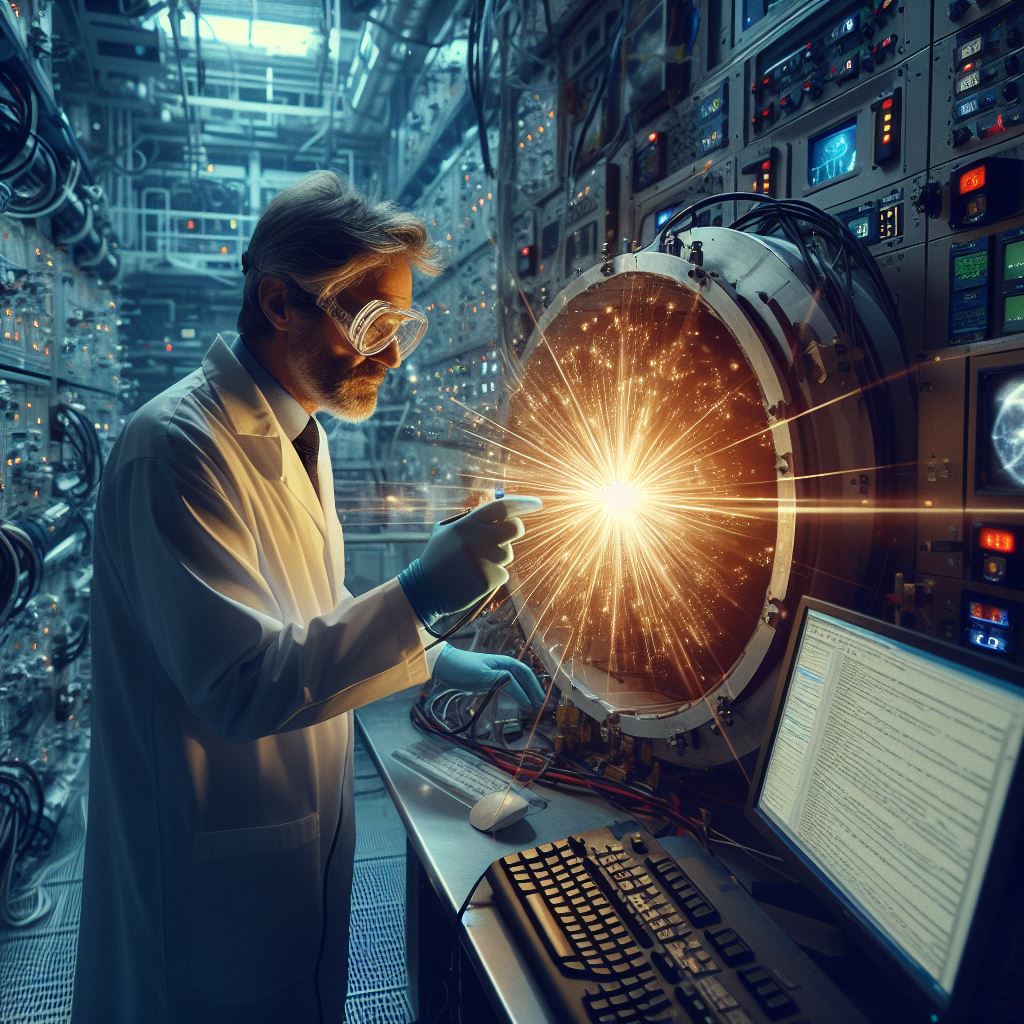Introduction
In the dynamic realm of Australian scientific exploration, the life of a physicist unfolds as a captivating journey of discovery and innovation.
This blog post ventures into the intricate tapestry of a physicist’s daily existence, offering a compelling glimpse into their world of scientific inquiry and experimentation.
The spotlight of this narrative shines brightly on the bustling life of physicists in Australia, where each day presents a new canvas for exploration and discovery.
From unraveling the mysteries of the cosmos to delving into the subatomic realm, physicists play a pivotal role in expanding the horizons of human knowledge and understanding.
Our endeavor is to illuminate the path trodden by physicists in Australia, offering insights into their work, routines, and the myriad challenges they encounter along the way.
By peeling back the layers of their daily lives, we aim to provide a nuanced understanding of the dedication, passion, and intellectual rigor that characterize the life of a physicist.
Prepare to embark on an enlightening journey filled with captivating anecdotes, profound insights, and intriguing revelations.
Through firsthand accounts and expert analysis, we endeavor to paint a vivid portrait of the physicist’s world, inviting readers to immerse themselves in the wonders of scientific exploration.
So, fasten your seatbelts and get ready to explore the fascinating realm of physics through the eyes of those who navigate its complexities every single day.
Overview of the field of physics
Physics is a branch of science that deals with the fundamental principles of the universe. It seeks to understand the natural phenomena and interactions of matter and energy.
Physics is crucial in scientific research as it forms the foundation for other scientific disciplines.
Importance of physics in scientific research
- Physics plays a crucial role in advancing scientific knowledge and understanding of the universe.
- It provides the basis for other scientific disciplines, such as chemistry, biology, and engineering.
- Physics allows us to explain and predict the behavior of objects and systems at different scales.
- It helps us understand the fundamental forces that govern the interactions between particles and matter.
- Physics enables us to develop new technologies that have practical applications in various fields.
- It contributes to solving real-world problems and addressing global challenges.
Subfields within physics
Physics is a wide-ranging field that encompasses various subfields of study. Some of the prominent ones include:
Astrophysics
Astrophysics focuses on the study of celestial objects, such as stars, planets, galaxies, and the universe as a whole. It seeks to understand their properties, formation, and evolution using principles of physics.
Quantum physics
Quantum physics delves into the behavior of matter and energy at the smallest scales, such as atoms and subatomic particles. It deals with concepts like wave-particle duality, quantum entanglement, and quantum mechanics.
Particle physics
Particle physics investigates the fundamental particles that make up the universe and the forces that govern their interactions. It involves studying high-energy particle accelerators and detecting particles like quarks, leptons, and bosons.
Contributions of physicists to discoveries and technology advancements
- Physicists have contributed to major scientific breakthroughs, such as the theory of relativity and the discovery of the Higgs boson.
- They develop and apply advanced mathematical models and theories to understand complex physical phenomena.
- Physicists design and build experimental setups and instruments to gather data and verify theoretical predictions.
- They contribute to the development of cutting-edge technologies, such as lasers, nuclear power, and semiconductor devices.
- Physicists also apply their knowledge and skills to other fields, like medicine, environmental science, and renewable energy.
In Australia, physicists play a crucial role in scientific research and innovation. They work in various institutions, including universities, research centers, and government organizations.
They collaborate with other scientists and experts to address pressing challenges and make significant contributions to advancing knowledge and technology.
Being a physicist in Australia means having access to state-of-the-art facilities and resources for conducting experiments and data analysis. It involves continuous learning and keeping up with the latest advancements in physics.
Australian physicists are actively involved in international collaborations and contribute to global scientific endeavors.
In review, physics is a fascinating and essential field that drives scientific research and technological advancements.
Physicists in Australia and around the world continue to push the boundaries of knowledge, unraveling the mysteries of the universe and shaping our understanding of the fundamental laws of nature.
Read: Australian Women in Chemistry: Trailblazers
Qualifications and Education
In order to become a physicist in Australia, there are certain educational requirements that need to be fulfilled.
Bachelor’s Degree
Having a bachelor’s degree in physics or a related field is crucial for aspiring physicists. This provides the fundamental knowledge and skills required for further study and research in the field.
During the undergraduate years, students learn about the principles of physics, mathematics, and other related disciplines. They gain a strong foundation in analytical thinking, problem-solving, and experimental techniques.
Moreover, this degree helps students develop critical thinking abilities and enhances their ability to apply theoretical concepts to practical situations.
Higher Education
After completing a bachelor’s degree, it is highly recommended to pursue higher education through master’s or doctoral programs.
Your Personalized Career Strategy
Unlock your potential with tailored career consulting. Get clear, actionable steps designed for your success. Start now!
Get StartedMaster’s programs in physics allow students to specialize in a specific area of interest, gain more advanced knowledge, and engage in research projects. These programs typically take two years to complete.
Doctoral programs are for those who wish to further their research and contribute to the field of physics through original discoveries and advancements. These programs generally take around four to six years to complete.
During these advanced programs, students work closely with professors and researchers, explore new scientific concepts, and conduct in-depth experiments.
They develop extensive knowledge in their specialized area and contribute to the existing body of scientific knowledge.
Continuous Learning and Research
Being a physicist requires continuous learning and staying updated with the latest scientific research and advancements.
Physicists need to constantly read scientific journals, attend conferences and seminars, and collaborate with other researchers in order to stay current with the latest discoveries and theories.
The field of physics is constantly evolving, and new concepts and theories are emerging. By staying updated, physicists ensure that their knowledge remains relevant and that they can contribute effectively to the scientific community.
Additionally, continuing education courses and workshops can help physicists enhance their skills and knowledge in specific areas, such as computer programming or data analysis.
In summary, the educational journey to become a physicist in Australia starts with a bachelor’s degree in physics or a related field. Pursuing higher education through master’s or doctoral programs allows for specialization and research opportunities.
Continuous learning and staying updated with the latest scientific research are essential for a successful career in physics.
Read: Balancing Lab Work and Life in Australia
Work Environment
A physicist’s work environment varies depending on whether they work in an academic or industry setting.
In both cases, physicists spend a significant amount of time conducting research and analyzing data.
In academic settings, physicists typically work in laboratories or research institutes.
These environments are equipped with state-of-the-art equipment and facilities to support scientific experiments.
They often collaborate with other scientists and graduate students on various research projects.
In industry settings, physicists may work in private companies, government organizations, or research institutions.
Physicists in these settings often focus on applied research and development, finding practical applications for their scientific knowledge.
They may work in offices, research facilities, or even out in the field.
Job opportunities for physicists are available in a wide range of organizations.
Research institutions, universities, government organizations, and private companies all offer positions for physicists.
Research institutions and universities are the traditional employers for physicists, offering opportunities for both fundamental research and teaching.
Government organizations also employ physicists in areas such as defense, national labs, and regulatory agencies.
Private companies, especially in fields like electronics, aerospace, and energy, frequently employ physicists for research and development purposes.
Physics is a highly collaborative field, often involving teamwork and multidisciplinary projects.
Physicists regularly work with other scientists, including engineers, mathematicians, and computer scientists, to solve complex problems and advance knowledge in their respective fields.
Importance of effective communication and presentation skills
Effective communication and presentation skills are paramount in a physicist’s work environment. Physicists must be able to effectively communicate their research findings to both scientific and non-scientific audiences.
They are often required to present their research at conferences, publish papers in scientific journals, and explain complex concepts to colleagues, policymakers, and the general public.
Strong communication skills help physicists gain recognition for their work and facilitate collaboration with other scientists.
In short, the work environment for physicists is diverse, ranging from academic institutions to industry settings.
Job opportunities are available in various research institutions, universities, government organizations, and private companies. Collaboration, effective communication, and presentation skills are crucial for success in this field.
Read: Navigating Chem Grad Studies in Australia
Stand Out with a Resume That Gets Results
Your career is worth more than a generic template. Let us craft a resume and cover letter that showcase your unique strengths and help you secure that dream job.
Get Hired
Daily Routine
Morning
- Physicists in Australia typically start their day early, waking up around 6 AM.
- After getting ready, they usually have a healthy breakfast to fuel their bodies and minds for a productive day.
- The morning routine often involves checking emails and catching up on the latest scientific publications and research advancements.
- They may also take some time to review and analyze data collected from ongoing experiments.
Experimentation
- Physicists spend a significant portion of their day conducting experiments in well-equipped laboratories.
- They design and set up experiments, carefully manipulating variables and monitoring instruments for precise measurements.
- Collecting data is a crucial aspect of their work as they strive to gather evidence to support or challenge existing theories.
- Throughout the experimentation process, physicists are constantly adjusting, fine-tuning, and troubleshooting to ensure accurate results.
Analysis and Interpretation
- Once data is collected, physicists meticulously analyze and interpret the results using statistical techniques and advanced software.
- They look for patterns, trends, and anomalies that may lead to new discoveries or confirm existing theories.
- Critical thinking and problem-solving skills are highly valued as physicists grapple with complex data sets and analyze their implications.
- Collaboration with colleagues and experts is common as they discuss findings and exchange ideas to gain different perspectives.
Research and Writing
- Physicists dedicate a considerable amount of time to writing research papers, documenting their findings, and submitting them to esteemed journals.
- The writing process involves explaining methodologies, presenting results, and drawing conclusions based on evidence.
- They also engage in extensive literature reviews, ensuring their work aligns with existing knowledge and contributes to the scientific community.
- Creativity comes into play as physicists strive to present their work in a clear, concise, and engaging manner to communicate complex ideas effectively.
Meetings and Collaborations
- Physicists often participate in meetings, where they discuss ongoing projects, share progress, and brainstorm solutions to challenges.
- Collaborations with other physicists, scientists, and researchers from different disciplines are vital for interdisciplinary studies and breakthroughs.
- These interactions are opportunities for physicists to exchange knowledge, learn from others’ expertise, and broaden their perspective on research problems.
Lifelong Learning and Professional Development
- Continuing education is integral to a physicist’s routine, as they constantly strive to stay updated with the latest advancements.
- They attend conferences, workshops, and seminars to network with peers, present their work, and gain new insights and inspiration.
- Physicists also engage in self-directed learning, reading scientific papers, and exploring new theories and concepts to expand their knowledge base.
In a nutshell, the daily routine of a physicist in Australia involves a combination of data analysis, experimentation, research, writing, collaboration, and continuous learning.
Problem-solving skills, critical thinking, and creativity play a vital role in addressing the challenges faced by physicists in their quest for scientific discovery and innovation.
Read: Innovative Chemistry Startups in Australia
Research and Experimentation
Significance of Research in the Field of Physics
Research is crucial in physics as it is the driving force behind new discoveries and advancements in the field. Through research, scientists gain a deeper understanding of the laws and principles that govern the universe.
Designing and Carrying Out Experiments to Test Hypotheses
The process of designing experiments involves formulating a hypothesis, identifying variables, and determining the appropriate methodologies. Scientists carefully plan experiments to ensure accurate and reliable results.
Use of Sophisticated Equipment and Technology in Conducting Experiments
Physics experiments often require the use of sophisticated equipment and technology. Advanced instruments such as particle accelerators, telescopes, and spectrometers aid physicists in conducting experiments with precision and accuracy.
Need for Meticulous Record-Keeping and Data Analysis
Meticulous record-keeping and data analysis play a crucial role in physics research. Scientists meticulously record experimental details to ensure reproducibility and transparency.
Data analysis allows for the extraction of meaningful insights and the verification of hypotheses.
List of Benefits of Research in Physics
- Advancement of Knowledge: Research in physics expands our understanding of the fundamental laws that govern the universe.
- Technological Innovations: Research often leads to the development of new technologies with practical applications in various industries.
- Improvements in Society: Physics research contributes to advancements in healthcare, energy, communications, and environmental sustainability.
- Exploration of the Unknown: Physicists explore uncharted territories of the universe, unraveling mysteries and pushing the boundaries of human knowledge.
- Collaboration and Networking: Research fosters collaboration among scientists, leading to the exchange of ideas and the formation of international partnerships.
- Career Opportunities: A thriving research community creates numerous career opportunities for physicists and scientists in academia, industry, and government sectors.
- Education and Outreach: Physics research inspires future generations, promoting scientific literacy and inspiring young minds to pursue careers in STEM fields.
List of Steps in Designing and Carrying Out Experiments
- Identify the Research Question: Formulate a clear research question or hypothesis to investigate.
- Review Existing Literature: Conduct a comprehensive literature review to understand the current state of knowledge.
- Experimental Design: Design the experiment, including selecting variables and controls.
- Data Collection: Collect data using appropriate equipment and techniques.
- Record-Keeping: Maintain meticulous records of experimental procedures, variables, and observations.
- Data Analysis: Analyze the collected data using statistical methods and visualization techniques.
- Conclusion: Draw conclusions based on the analysis of the data and evaluate whether the hypothesis is supported or not.
In fact, research and experimentation are integral parts of a physicist’s life in Australia. These activities drive the advancement of knowledge, require the use of sophisticated equipment, and demand meticulous record-keeping and data analysis.
Through research, physicists contribute to society and explore the mysteries of the universe.
Collaboration and teamwork
Collaboration and teamwork are essential aspects of scientific research in physics.
Physicists often work together with other scientists, such as mathematicians, engineers, and computer scientists, to achieve breakthroughs and advancements in their field.
The collaborative nature of scientific research in physics is rooted in the complexity of the subject.
Physics is a discipline that requires expertise from various fields and requires a team effort to tackle complex problems.
By working together with colleagues from different backgrounds, physicists can bring different perspectives and skill sets to the table.
Working with other scientists, including mathematicians, is crucial in the field of physics.
Mathematics provides the language and tools for physicists to develop theories and models that explain the fundamental principles of the universe.
Collaborating with mathematicians not only enhances the accuracy of the mathematical formulations used in physics but also expands the boundaries of knowledge by exploring new mathematical concepts.
Engineers play a vital role in physics research, especially when it comes to translating theoretical concepts into practical applications.
Collaboration with engineers helps physicists develop experiments and design instruments that can test and validate their theories.
Engineers also bring their expertise in building and maintaining experimental setups, ensuring the accuracy and reliability of the data collected.
Computer scientists are integral to the field of physics due to the increasing reliance on computational simulations and data analysis.
Physicists often work closely with computer scientists to develop algorithms and software programs that can handle the massive amounts of data generated in experiments.
Collaboration with computer scientists enables physicists to make sense of complex data sets and extract meaningful insights.
Benefits of sharing ideas, expertise, and resources within a research team
One of the major benefits of collaboration in physics research is the sharing of ideas.
By working in teams, physicists can bounce ideas off each other, facilitating innovation and creativity.
Collaborative environments foster a culture of intellectual exchange, where researchers can build upon each other’s ideas and collectively push the boundaries of knowledge.
Collaboration also allows physicists to combine their expertise and resources, leading to more efficient and cost-effective research.
By pooling together their resources, such as laboratory equipment, computational resources, and funding, researchers can tackle more significant challenges and make faster progress.
In addition to collaboration within a research team, physicists also benefit from collaborations with national and international scientists.
Physics is a global field, and advancements in research often require collaboration beyond borders.
Collaborating with physicists from different countries brings together diverse perspectives and expertise, further enriching scientific endeavors.
International collaborations also provide access to unique facilities and resources that may not be available locally.
Physicists can collaborate with international colleagues to conduct experiments at specialized facilities or use advanced equipment, enhancing the scope and quality of their research.
Collaborations with national and international physicists not only advance research but also foster a sense of community within the scientific community.
Physicists can build networks and establish long-term collaborations, enabling knowledge exchange and facilitating future joint projects.
In essence, collaboration and teamwork are crucial in scientific research in physics.
Physicists collaborate with mathematicians, engineers, and computer scientists to leverage their collective expertise and resources.
The sharing of ideas and knowledge within a research team, as well as collaborations with national and international physicists, drive advancements in physics research and contribute to the overall progress of the field.
See Related Content: Women in AU Science: Research Careers
Challenges and Rewards
Being a physicist in Australia comes with its fair share of challenges, but the rewards of pursuing a career in this field are equally enticing.
Challenges Faced by Physicists in Australia
Physicists in Australia constantly face the challenge of securing grants and funding for their research. The competition in this area is fierce, with limited resources available.
Furthermore, the pressure to publish their research findings is immense. Physicists strive to make significant contributions to their field, but this requires constant dedication and hard work.
Long working hours are another challenge that physicists often encounter. The pursuit of scientific excellence demands extensive time and effort, causing a significant strain on one’s personal life.
Transform Your LinkedIn for Maximum Impact
Elevate your professional brand with a LinkedIn profile that attracts recruiters, showcases your expertise, and maximizes opportunities. Stand out in your industry with a profile built for success.
Boost ProfileThe Rewards of a Physics Career
Despite the challenges, pursuing a career in physics offers a range of rewarding experiences and opportunities.
Firstly, making significant scientific contributions is one of the greatest rewards for physicists. Through their research, they have the potential to unravel the mysteries of the universe and advance our understanding of fundamental concepts.
In addition to making groundbreaking discoveries, physicists find immense intellectual fulfillment in their work. Constantly pushing the boundaries of knowledge stimulates their minds and satisfies their curiosity.
Moreover, physicists have the ability to impact society through their research. Their findings can lead to technological advancements, such as the development of more efficient energy sources or medical breakthroughs.
Furthermore, a career in physics offers a variety of opportunities to collaborate with other experts in the field. Physicists often work in teams, fostering an environment of knowledge-sharing and innovation.
While physicists in Australia face challenges such as intense competition for grants, limited funding, and long working hours, the rewards of pursuing a career in this field are immense.
Making significant scientific contributions, experiencing intellectual fulfillment, and having the potential to impact society are all compelling reasons to choose a career in physics.
Despite the obstacles they may encounter along the way, physicists in Australia continue to dedicate themselves to the pursuit of knowledge, pushing the boundaries of our understanding of the physical world.
Gain More Insights: Enviro Science Tech: Tools of the Trade in Aus
You Might Also Like: Australian Biology Research Fields: An Overview
Conclusion
In closing, this blog post explored a day in the life of a physicist in Australia. From conducting experiments to analyzing data, physicists play a crucial role in advancing scientific knowledge.
Their dedication and passion have the power to unravel the mysteries of the universe.
Aspiring physicists should consider the exciting opportunities available in Australia. With world-class research facilities and collaborative environments, Australia provides the perfect platform for budding scientists to flourish.
It is important to pursue one’s passion for physics and seize the opportunities that come along. By dedicating themselves to this field, aspiring physicists can make significant contributions to scientific discoveries and advancements.
In the vast and ever-evolving field of physics, there are endless possibilities waiting to be explored. Embrace the challenges, push boundaries, and strive for excellence.
With each breakthrough, you have the potential to redefine our understanding of the universe.
So, to all aspiring physicists out there, remember that you have the power to uncover the secrets of the universe. Embrace the excitement and endless possibilities that this field offers, and let your curiosity soar.
The future of physics is bright, and it is waiting for you to make your mark.




